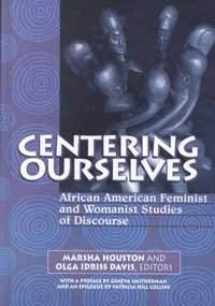
Centering Ourselves: African American Feminist and Womanist Studies of Discourse (Hampton Press Communication Series. Communication Alternatives)
ISBN-13:
9781572733503
ISBN-10:
1572733500
Author:
Marsha Houston, Olga Idriss Davis
Publication date:
2001
Publisher:
Hampton Pr
Format:
Hardcover
249 pages
FREE US shipping
Book details
ISBN-13:
9781572733503
ISBN-10:
1572733500
Author:
Marsha Houston, Olga Idriss Davis
Publication date:
2001
Publisher:
Hampton Pr
Format:
Hardcover
249 pages
Summary
Centering Ourselves: African American Feminist and Womanist Studies of Discourse (Hampton Press Communication Series. Communication Alternatives) (ISBN-13: 9781572733503 and ISBN-10: 1572733500), written by authors
Marsha Houston, Olga Idriss Davis, was published by Hampton Pr in 2001.
With an overall rating of 3.7 stars, it's a notable title among other
books. You can easily purchase or rent Centering Ourselves: African American Feminist and Womanist Studies of Discourse (Hampton Press Communication Series. Communication Alternatives) (Hardcover) from BooksRun,
along with many other new and used
books
and textbooks.
And, if you're looking to sell your copy, our current buyback offer is $0.37.
Description
In this book the editors suggest an approach to the study of black women as communicators that centers the knowledge and wisdom conveyed through the 19th and 20th centuries both in the public rhetoric of notable black women and in ordinary women's everyday conversations. The goal is to present what is not found in other communication books and Joomals - an angle of vision on black women's rhetoric and everyday talk that both takes account of the material circumstances and ideological contexts of black women's communication and honors black women's interpretations of discourse. Although the authors employ a variety of contemporary communication concepts and theories, all make the traditions of African American feminist and womanist thought central to their analyses. In Part I a framework for liberatory research is proposed. Each author in Part II endeavors to provide concrete, socially useful description and critique of African American women's discourse. Three of the major themes that interweave in these chapters are multiple consciousness, the value of sisterhood and community, and the culture of resistance.


We would LOVE it if you could help us and other readers by reviewing the book
Book review

Congratulations! We have received your book review.
{user}
{createdAt}
by {truncated_author}


